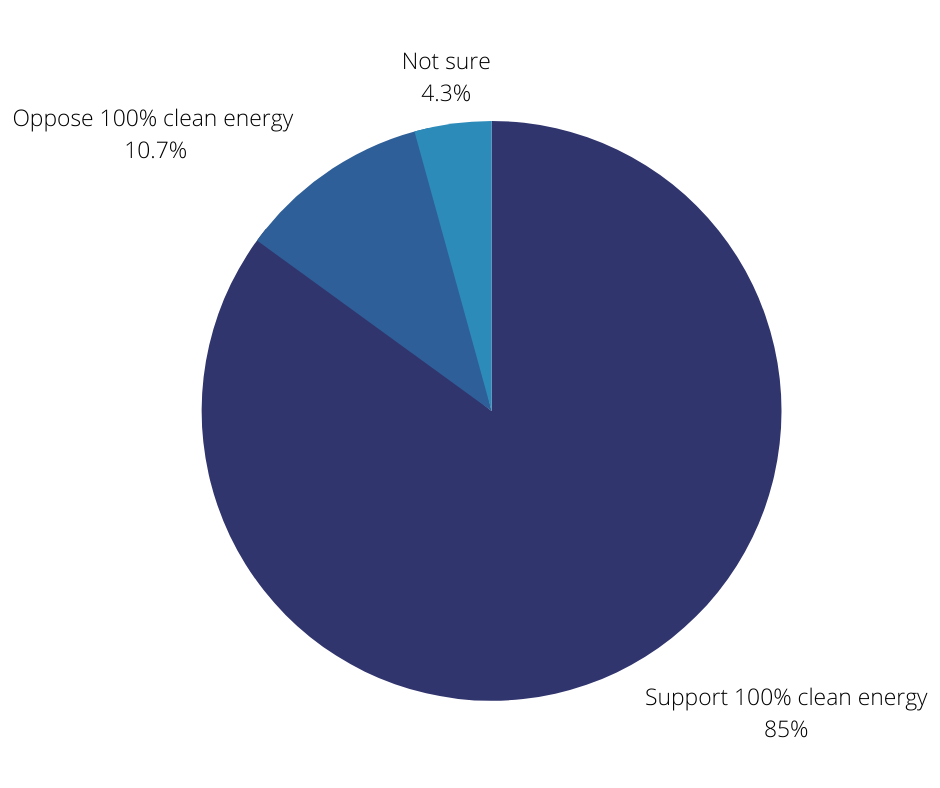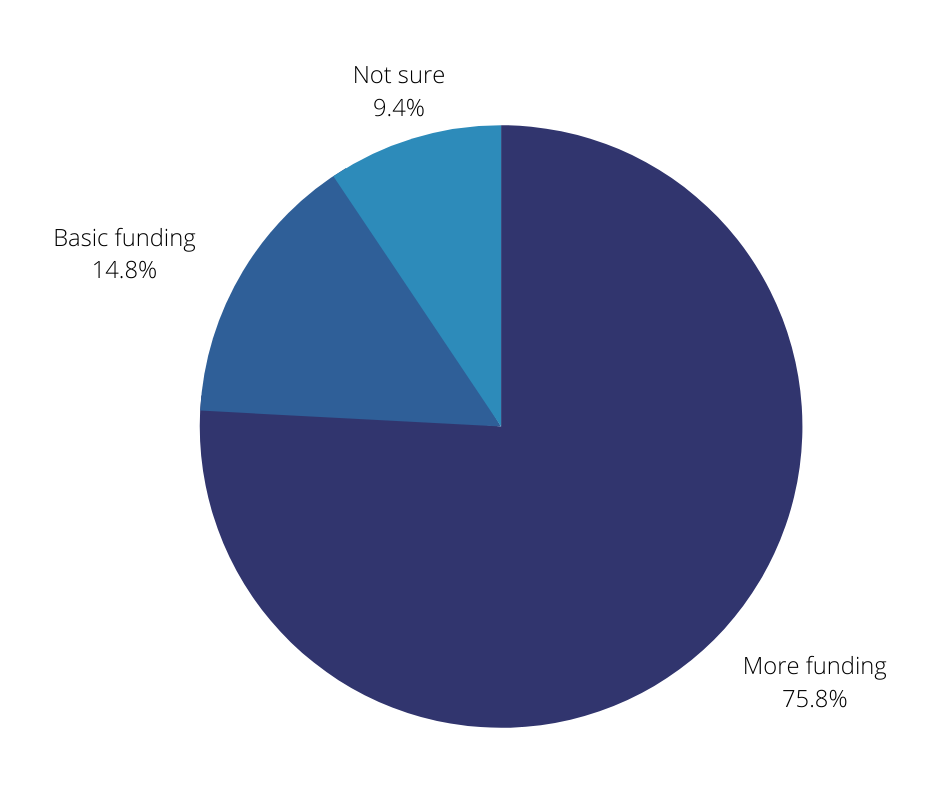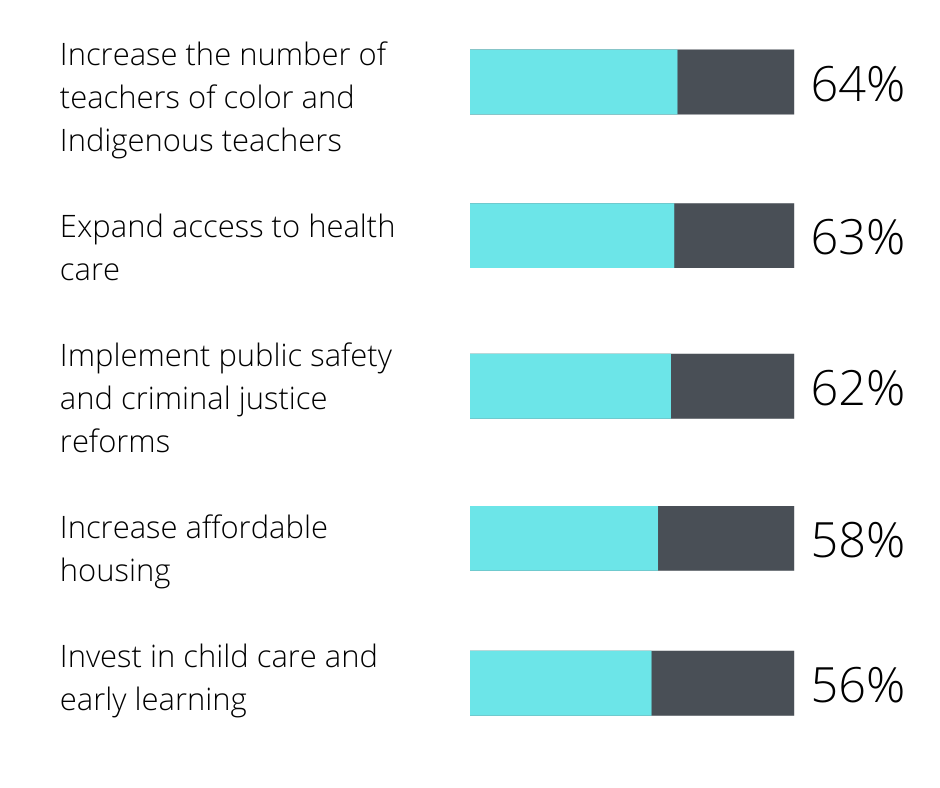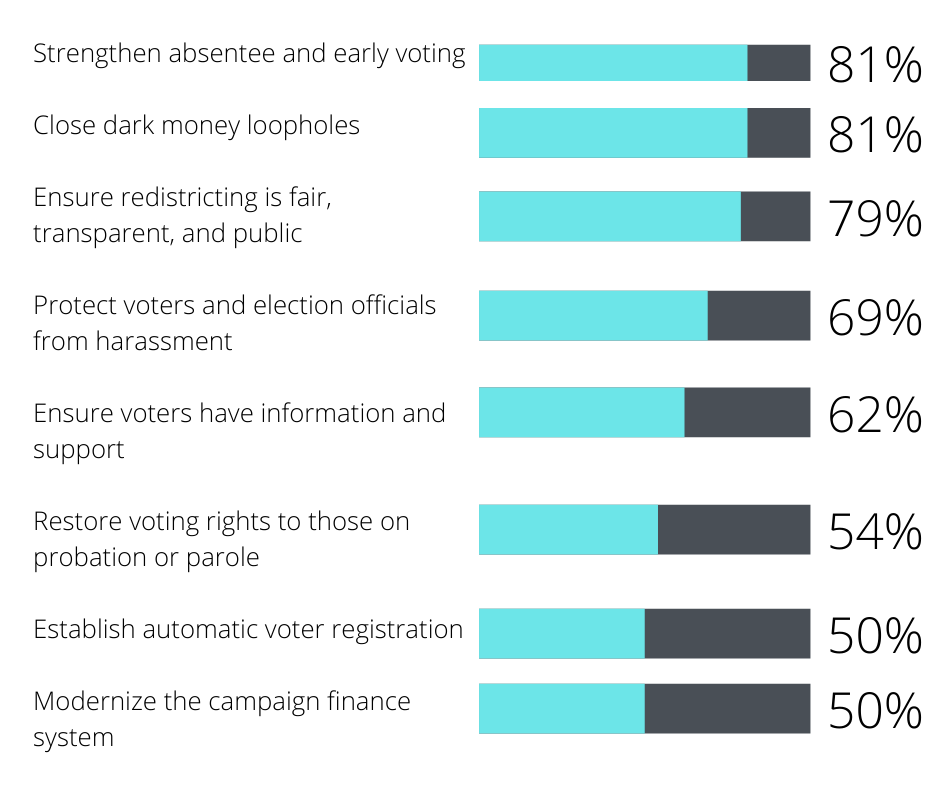Dear Neighbors,
It’s officially been one year since you elected me to serve as your representative in the Minnesota House! One of my priorities during my first year at the Legislature has been reaching out to hear what’s important to you and ensuring our policy is rooted in the voices of people in our community. While COVID-19 has made it more challenging to connect, I’m grateful to all of you who’ve shared your thoughts, dreams, fears, experiences, and hopes for our future.
You may remember that at the beginning of the legislative session, I invited you to share your thoughts by completing a constituent survey. This survey asked residents of 63B to share what was on their mind, the issues they care about, and input on policy solutions to address some of Minnesota’s biggest challenges.
In this edition of my Issues Connecting Community and the Capitol series, I want to share some of the results with you and show how your voice is impacting policy change. This data reflects responses we received from community members by mail and online. Although the data unfortunately can’t capture those who didn’t respond, it’s a good snapshot of the issues that are important to people in our community.
Addressing the Climate Crisis
Taking action to address climate change is a top priority for the residents of our district. It’s an urgent imperative shared by people – and countries – around the globe who are gathered at COP26, the United Nations climate summit. More than 60 Minnesotans, including two of my fellow House DFLers, are there advocating for urgent government action, such as the methane regulations President Biden announced last week. Like other attendees, they’re sharing information and working with people from around the world to push for solutions. The goal is to send people back to their communities with more information and to build pressure to commit to meaningful actions, such as reducing greenhouse gas emissions.
Your responses to the legislative survey indicated that climate issues are very important to you. 85 percent of constituents who responded support putting Minnesota on a path to reach 100 percent clean energy by 2040, a key policy change to help fight climate change.

There’s an urgent imperative to address the climate crisis at the local, state, federal, and global level. I’ll continue supporting a rapid and just transition to 100 percent clean energy and other climate-related legislation.
Investing in Our Schools and Students
Our district is committed to ensuring every kid in our community gets a great education. The overwhelming majority of people who responded to my legislative survey are in favor of investments in public education, with 75.8 percent supporting increased state-level funding for public schools. If you’re interested in learning more about this issue, I took a deeper dive into school funding in a previous edition of Issues Connecting Community and the Capitol.

Last week’s elections showed that our district’s strong support for public education is shared by people across Minnesota. 70 percent of school district referendums passed as voters across the state went to the polls and voted for property tax levy increases in order to provide more funding for local schools.
With stronger state-level funding, we could ensure all Minnesota students get the same high-quality education, no matter where they live, and reduce the inequities created when school districts are forced to rely on property tax referendums to meet the basic needs of students. It also means providing schools with the resources they need to tackle the devastating opportunity gaps impacting our students of color and Indigenous students.
Investing in public education was a big priority for House DFLers this year. We fought hard to deliver the largest investments in education that our state has made in 15 years. However, we can and must do more to fully fund our public schools and to make sure every kid has access to a world-class education. You can count on me to keep fighting for our students and to ensure schools have the resources to meet every student’s needs without having to rely on local referendums and school fundraising drives.
Advancing Racial Justice
Minnesota has some of the worst racial disparities in the country, and people in our district believe we need to create a state where everyone has the opportunity to thrive. This year, the House Select Committee on Racial Justice published a thorough and thoughtful examination of the causes and impacts of racial inequities in Minnesota, with policy recommendations for reducing the shameful disparities. In my legislative survey, community members shared their thoughts on some of these proposals, including support for the following policies:

We were able to overcome opposition from Senate Republicans to pass some of these policies this year. The budget we passed makes historic investments in programs to increase the number of teachers of color and Indigenous teachers, a key tool to reduce the opportunity gap in our schools. We took steps to address racial disparities in health care, especially in maternal and infant health, including delivering funding to expand services for Black Minnesotans and Indigenous people who are pregnant. We passed public safety reforms to complement the Minnesota Police Accountability Act we passed in 2020, including restrictions on the use of no-knock warrants, a requirement that law enforcement agencies responding to mental health calls make a referral to mental health crisis teams when one’s available, and a measure to help keep bad police officers off the streets.
This is just the beginning. There is a lot of work ahead of us to advance racial equity and to ensure every Minnesotan is safe, healthy, and thriving. This effort will take all of us, and I’ll continue working with you, community leaders, and colleagues at every level of government to create a more equitable community and state.
Strengthening Our Democracy
In this make-or-break moment, many of you support taking action to defend and strengthen our democracy, including the following policies:

Many of the election reforms listed above are included in the Democracy for the People Act I introduced at the beginning of last session. Unfortunately, they met opposition in the Minnesota Senate. Instead of supporting these nonpartisan and urgently needed policies, Senate Republicans amplified disinformation and conspiracy theories to push extreme anti-voter bills modeled on those passed by Republican legislatures in Georgia, Texas, Arizona, and Florida. DFLers protected Minnesota’s proud tradition of voter access and fair elections from these attacks. One provision I drafted to strengthen absentee voting and ensure election officials have the resources to offer ballot drop boxes was signed into law.
Protecting our democracy is extremely important, now more than ever. As some of you may know, Congress is considering two critical bills – the Freedom to Vote Act and the John Lewis Voting Rights Advancement Act – to protect and strengthen the freedom to vote in every state. Last week, Republicans filibustered the John Lewis Voting Rights Advancement Act, preventing the Senate from even being able to debate the bill, which the majority of the American public supports.
Given the attacks on voting rights we’re seeing in states across the country, it is critical that the Senate pass this legislation to ensure people of every race, zip code, generation, and political persuasion can participate in our democracy. I will keep fighting to pass the Democracy for the People Act here in Minnesota. I hope you’ll join me to keep the pressure on the U.S. Senate to protect the freedom to vote for every American.
Share What Matters to You!
The best policy is rooted in the lives and experiences of Minnesotans. That’s why I need to keep hearing from you! As we approach the 2022 legislative session, I’m asking you to take a few minutes and fill out the Minnesota Values Project survey. Input you provide will help guide me and other House DFLers next year and beyond.
Let’s Connect!
The best part of legislative work is connecting with you and hearing your questions, ideas, and feedback. Here are a few easy ways we can connect:
- Come visit me virtually at my weekly office hours. I meet with constituents every Tuesday from 10 to 11 a.m. We’re using Zoom and phone calls to keep everyone safe, but I hope to be able to connect in person soon. If you’d like to reserve a time slot, please email Ellen at ellen.larson@house.mn or call (651) 296-5517.
- Let me know about upcoming neighborhood or community events that you’re hosting or attending, and I’ll try to make it!
- Please don’t hesitate to email me or call my office. You can reach me at rep.emma.greenman@house.mn or (651) 296-4200.
- I’d love your help in reaching more of our neighbors. Please feel free to share this email and my Facebook page with friends, family, and community members.
Let me end by saying thank you to all of you who have responded to my legislative survey, attended my office hours, called or emailed me, or had a conversation with me at a community event. It’s an honor to represent our engaged and caring community.
Please continue reaching out!
With gratitude,
Emma Greenman
State Representative